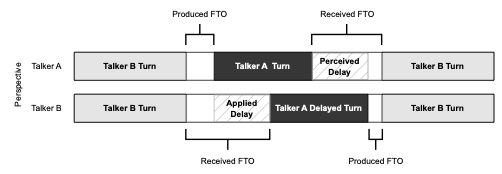Variable Delay Affects Turn-Taking Behavior in Noise

This study is, to our knowledge, the first to manipulate the turn-taking dynamics of conversation in real-time. We implement and vary the delay on a communication line between two talkers while they interact. This delay introduces perceived increases in the time it takes for a conversational partner to begin responding. We suspected that talkers would monitor this timing, and assume that an increase in this duration meant that the partner was having difficulty. The findings, based on dyadic conversations taking place in both the presence and absence of background noise, with and without delay, reveal that the manipulation of perceived turn-taking timing does elicit behavioral changes, but only when background noise is also present. This suggests that, when there is an expectation of difficulty, the timing of FTOs may be used as a cue to infer the difficulty level of a conversational partner.